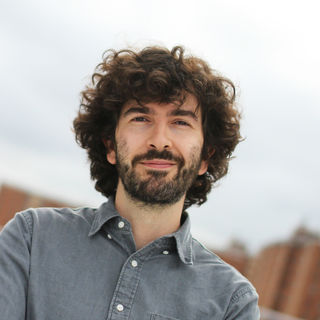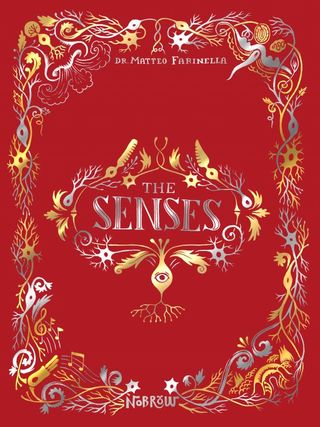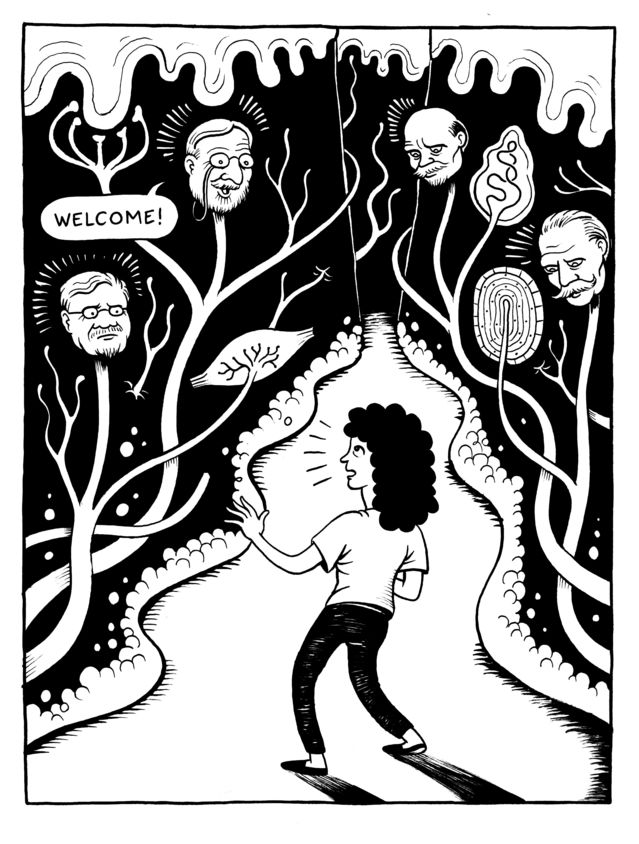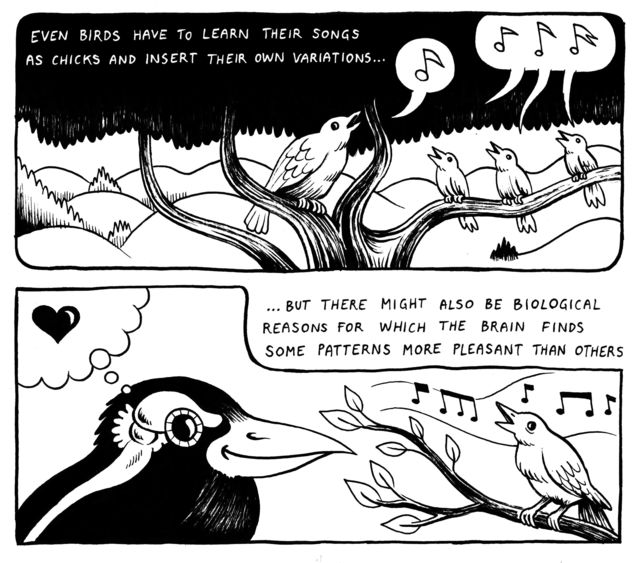Neuroscience
Your Senses, Your Self: An Interview with Matteo Farinella
Using comics to explain how the senses shape us.
Posted September 24, 2018

Matteo Farinella's The Senses is an elegant comic book primer on the science of the senses. Farinella is a neuroscientist, comics artist, and Presidential Scholar in the Society and Neuroscience at Columbia University. Like his previous book Neurocomic (a collaboration with Hana Ros), The Senses is a beautiful object, made with lush artistry you don't see much in publishing these days. Its material texture does justice to its conceptual elegance. Also, like Neurocomic, it takes the form of a quest tale. Farinella's bewildered protagonist is experimenting with a virtual reality device when she finds herself wandering through a forest of sense organs—guided by key figures in the history of science and philosophy, guides who help her (and us) understand how the senses shape both reality and identity.
The protagonist in The Senses explores our bodies as active “filters" for sensory experience. Why is that idea important? Why is a comic a helpful genre in exploring the complexity of the senses?

The senses were a challenging subject: We probably all had to study the five (traditionally recognized) senses in school, and there are already many excellent books written about each one of them. Most people take their senses for granted and think they already know everything about them. We rarely appreciate their complexity. However, after writing a book about the brain—a much more trendy subject—I felt it was important to celebrate our humble sensory organs. Because everything our brain knows comes from our senses, we would know nothing without them. Our almighty brain would be as useful as a computer without a keyboard, touchpad, or wireless.
In general, there are many reasons comics are a great medium to write about about science, but in this case it was mostly a way to repackage traditional material into a new and hopefully more engaging narrative. I had to condense a lot of information into a few pages, and without comics, it would have been difficult to tie it all together. It would have been a long list of science facts, maybe impressive but certainly not very memorable.
The book can be seen as a primer on the sciences of the senses, using the comic form to make complex ideas accessible? What are a few of the more surprising or counterintuitive aspects of the senses you wanted to visualize and explain?
Another great thing about comics (besides the narrative element) is that sometimes you can build a much more convincing argument with pictures than words. For example, by visualizing the sensory pathways as physical 'paths' that the protagonist has to travel along, I was trying to convey how long and convoluted these connections between the brain and the outside world actually are. Putting that into words: "There are n synaptic connections between your retina and the visual cortex" doesn't drive home the message in the same way. Numbers are abstract, but we can all relate to the feeling of going on a long walk.

For me, this was one of the most fascinating things about the subject: Even if in everyday life we perceive sensory information as arriving to us effortlessly and in 'real time,' there is a lot of processing and filtering that goes on under the hood. What we perceive as 'reality' is not actually the raw data but a very elaborate story that our senses concocted for us. I think that knowing this should make us a bit more humble and maybe not always assume that our experience and 'point of view' is so objective and universal. There are many subtly different ways of experiencing and understanding the world.
The book is almost as philosophical as it is scientific. Your characters—some of them famous figures in the history of science and philosophy—make the point again and again that the senses make or build reality. You give the example that human hair is much less sensitive than the hair of many other animals, which leads to a very different set of perceptions about the world. Later, one of your characters explains that humans see only a fraction of the colors that move through the earth’s atmosphere, those within our “optical window.” I’d love to hear you talk a little bit about how sensory experiences shapes reality.
Thank you for asking this question. Although I have tried not to make it too explicit until the very end, the philosophical angle was one of my main motivations for writing this book. As a neuroscientist trained in biology I have always been frustrated by how anthropocentric the field of neuroscience has become. Especially when it comes to consciousness and other 'higher' functions there is often the assumption that there must be something special about human brains, and by 'special' we of course mean 'superior'. This is clearly a baggage from our religious past but it is being constantly challenged by new research. From tool use to language and memory we are discovering that other animals—if tested in the right way—can easily perform as well as—or even better than—humans. Some people find this difficult to accept and their solution is to redefine what we mean by 'language' or 'intelligence' so that we can have our exclusive 'human club' for a little longer. I find this both philosophically questionable and scientifically counterproductive.

If we really want to understand 'how the brain works' instead of focusing only on what makes us 'special' we should be looking for similarities first, and then try to explain the differences. In that sense, I think we have a lot to learn from simpler organisms, maybe even invertebrates. This is why I have so many animals talking back to humans and pointing out our limitations. No brain is 'better' than the others, each brain is 'perfect' in its own way, for its own environment (i.e. its sensory inputs). Bat brains are good at navigating soundscapes, dog brains at extracting information from smells, naked mole rat brains at probing the darkness. We often make the mistake to think of brains as idealized machines, somehow disconnected from their environment, but brains were not designed they evolved. I think asking WHERE and WHY a brain evolved is the first step to understand HOW it works.
Your book made me think about the senses in a new way—as translation. Let me explain what I mean. You describe the brain’s “olfactory bulb” (a term I love). Nuclei of cells there enable us to smell, based on information they get via the cilia (little hair-like structures) of olfactory cells. The cilia “collect” smelly information from the world, in chemical form. So I mow my lawn. The cut grass releases chemicals. The cilia on the roof of my nose, poking through mucus, detect those chemicals and send a message along to the olfactory bulb, where electrochemical processes interpret the information, translating a chain of chemicals into my experience of smelling freshly cut grass. Do I have this right? If so, I’d love to hear your ideas about the various interfaces between sense organs and brain systems.
Yes, that's right, I like the analogy. In a way it can be applied not only to the senses but to the nervous system as a whole: the brain is a sort of universal electrical 'translator.' None of the things we perceive are unique to humans, nor animals for that matter. Plants can perceive light without a retina, and even the simplest unicellular organisms, like bacteria, are able to perceive gradients of chemicals in their environment (not unlike the smell of grass you just described). What our nervous system is really doing is simply taking all this unconnected information (molecules, temperature, vibrations and electromagnetic) and translating it all into electrical signals (the language of brain cells) so that they can be combined together and we are able to perceive 'reality' as a coherent experience. Following this analogy, we can think of all sorts of other information out there in the world (like electric fields and light polarization) which we are 'deaf to' simply because we don't have the right interface to translate it into our native neuro-language. But there is no reason why they couldn't be integrated in our perception as well, if only we had the right kind of receptors (like other organisms do).
With smell—and any sense, really—emotion and memory also get involved. How would you describe, or illustrate, the relationship between our senses, our memories, and our emotions?
Smell is often used as the textbook example of an 'emotional sense' simply because it seems more anatomically connected to the emotional areas of our brain, but that's probably an oversimplification (it could be that we rely more on emotions/memories to classify smells also because we lack linguistic classifications). The truth is that, as you point out, every sense is intertwined with emotions and memories and, more generally, the way we perceive the world is always influenced by our past experience and expectations. Most of my book focuses on the 'forward' connections: from our sensory receptors to the brain, but it is important to point out that there are just as many 'feedback' connections from our brain to our sensory networks. Our sensory perception is never purely 'objective' but constantly modulated by our internal states. An obvious example is how physical pain can become pleasure in the right circumstances, or the same exact molecules can be classified as a delicious cheese or something revolting depending on our mood, expectations and culinary habits.
You are a Presidential Scholar in the Society and Neuroscience at Columbia University. What’s the program like? What’s your role there.
Yes; unfortunately, I'm in my last year of this position. The program is intended for neuroscience postdocs who want to expand their research into the humanities and social sciences, and for humanities scholars who are doing interdisciplinary work relevant to neuroscience. Each scholar has a completely different project so we probably all have slightly different experiences of the program, but for it was simply life changing. After completing my Ph.D. in neuroscience, I left scientific research to draw comics, and I never thought I would find a place to pursue my eclectic interests within academia. During those years I was drawing comics about science, but I never really had a chance to think about 'why' comics could be an effective medium for science communication. Thanks to the PSSN program I was able to take a step back, and look at comics through the lens of educational psychology and cognitive neuroscience. In the past two years I have gained a much deeper understanding of how people engage with science, the role of metaphors and storytelling and much more. As a result, I think I will be able to draw more engaging comics, and hopefully also quantify their effects on the public perception of science.
I have to ask: What’s your next project?
That's a difficult question to answer right now... partly because of my position at Columbia, and partly because I always like to take a break after a long book, I'm not currently working on a new graphic novel. For the moment I am taking some time to experiment with different (shorter) formats and also to collaborate with other scientists. For example: I'm exploring the idea of 'data comics' with Benjamin Bach and other colleagues, collaborating a webcomic for ERCcOMICS and—since our Kickstarter is officially funded!—I will spend some time drawing a 'science tarot' deck with my friends at Massive Science. None of these projects will amount to a proper book but I hope they will help me reach new audiences.




